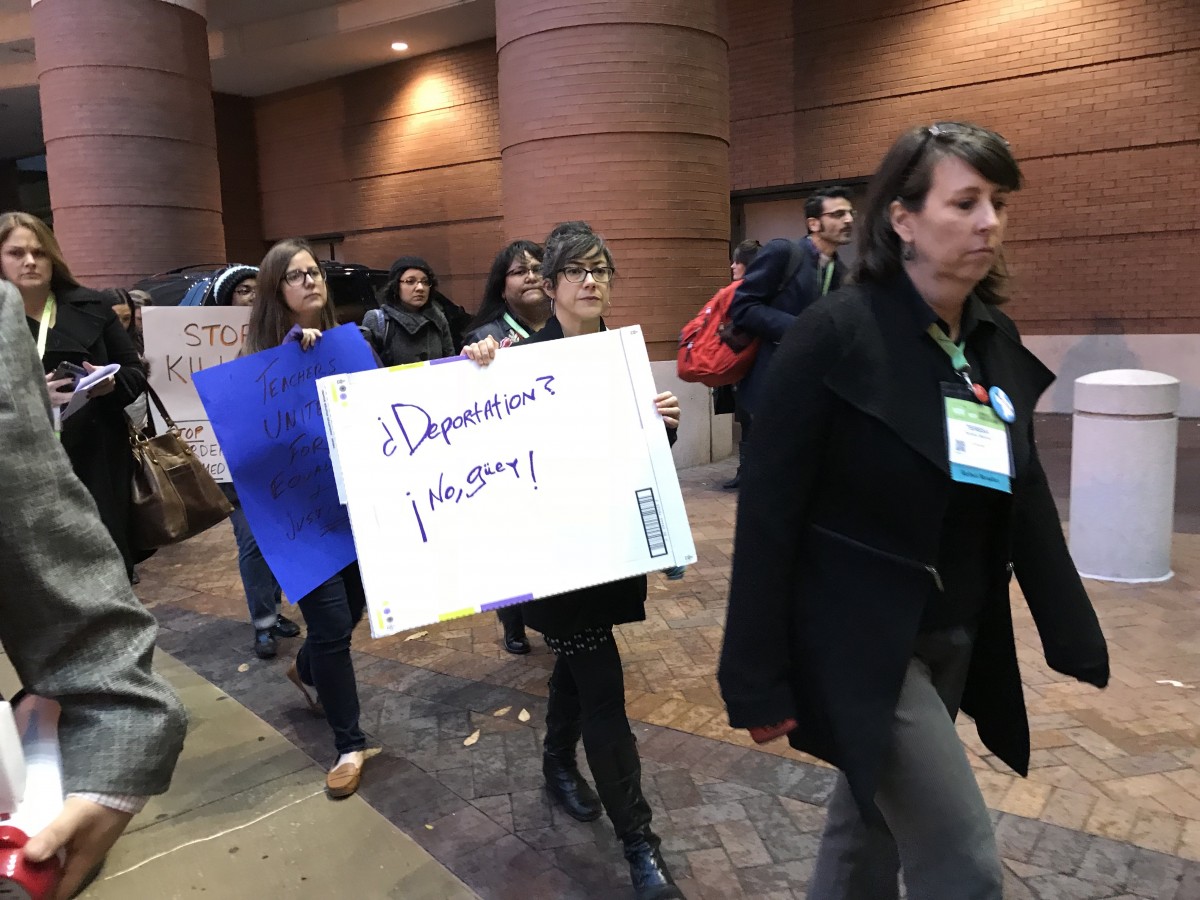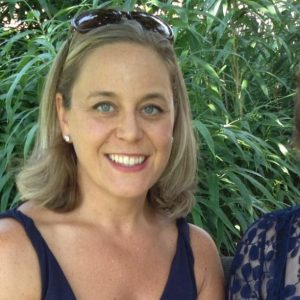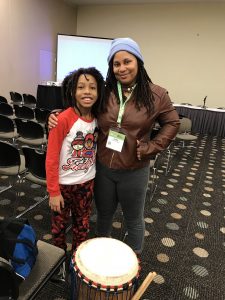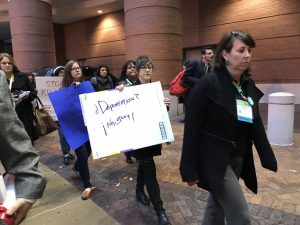Help Needed!: A Story of Bread Loaf Teacher Networking
0January 16, 2018 by Tom McKenna

 Alfredo Celedón Luján, BLSE 1987, Bread Loaf/New Mexico director’s assistant, is the 2017 recipient of the National Council of Teachers of English’s Advancement of People of Color Leadership Award, in recognition of his contributions to the development of NCTE’s professional community.
Alfredo Celedón Luján, BLSE 1987, Bread Loaf/New Mexico director’s assistant, is the 2017 recipient of the National Council of Teachers of English’s Advancement of People of Color Leadership Award, in recognition of his contributions to the development of NCTE’s professional community.
Help Needed!: A Story of Bread Loaf Teacher Networking
NCTE Conference at St. Louis
(Bread Loaf in St. Louis)
November 16-19, 2017
Velma
This is no bar joke.
We met in a bar, but this isn’t about alcohol or drinking. No, this is serendipity. Yes, more Bread Loaf fortuity, thus: Bread Loaf Teacher Networking.
~
Amy
She showed up at Bread Loaf Santa Fe in 2004. Bread Loaf had been recommended to her by Nick Otten, her colleague at Clayton High School in St. Louis. Nick, by coincidence, was also one of my housemates at Brandy Brook Cottage on the Vermont campus in the mid-‘80s. Amy called me before 6:00 one morning.
~
The National Council of Teachers of English
Many, perhaps most, NCTE members don’t know this: the site for the annual NCTE Conference is literally chosen years ahead. For example, the 2021 conference will be in Louisville, Kentucky. How do I know? I have served on the Executive Committee (EC) the last two years. The information is public, but as a member, I typically would not have thought much about conference until the call for proposals or until registration time. I wouldn’t have thought four years ahead; I wouldn’t have known or cared much about any of this had I not served on the EC, where I have witnessed the inner workings of the organization; this includes a bird’s-eye view of operations and fiscal matters. My point is that we members often do not know of the think-ahead planning. There’s no way NCTE can predict what’s going to be happening in a chosen city/conference site four years in the future.
NCTE’s choice of St. Louis for the 2017 conference site was made before the death of Michael Brown (may he rest in peace). Then other ugly stuff went down. About 90 days before the NCTE Conference, Missouri passed discriminatory “Jim Crow” Senate Bill 43, which was followed by NAACP’s Travel Advisory; then the Stockley verdict came down. During those three months, there were demonstrations, and there was chaos and violence in St. Louis. The Latinx and Black Caucuses were concerned. There was much discussion about what NCTE should do: move the conference, cancel it, or boycott. None of these options was feasible. Then an EC idea came forth: keep the conference as scheduled and create a Local Engagement Committee (LEC) that would demonstrate NCTE’s stand against SB 43, any discriminatory practices, and police brutality during the conference. But there was precious little time in which to plan.
As one of the co-chairs of the LEC, my charge was to coordinate a Town Hall meeting as a segment of NCTE’s activism against racism and discrimination. There were many Zoom meetings between August and November to organize LEC events. Co-Chair Valerie Taylor from Austin, Texas put together external happenings in the schools and community; Co-Chair Jeanette Toomer from NYC organized internal events, including a silent “take-a-knee” march from the Conference Center to Baer Park and back. At each Zoom meeting, we were asked if we had any local contacts for speakers, activists, and sympathizers.
~
Town Hall Meeting
November 18, 2017
Introduction by Alfredo Lujan“Welcome to the NCTE Local Engagement Committee Town Hall. The LEC was assembled in response to Senate Bill 43 and the NAACP Travel Advisory. Many NCTE members, particularly the caucuses, reacted to both announcements strongly—with some discussion about moving the conference from Missouri, canceling it, or boycotting it. SB 43, combined with the current federal administration’s endorsement of white supremacy, Muslimaphomia, Islamicphobia, wall-a-phobia, immigrantaphobia, DACA abrogation, anti-semitic rhetoric, police brutality . . . really? Action must be taken.
The NCTE caucuses and the Executive Committee stand firm against any discriminatory laws, policies, or practices. As a result, the Executive Committee has responded by promoting and hosting peaceful demonstrations through onsite protests at this conference. This town hall meeting is one such demonstration that calls for equity in education, the repudiation of SB 43, and any form of discrimination. In short: we seek social justice.
Here we have a talented panel that includes local and global perspectives: the indigenous, Jewish, LGBTQ, Latinx, Asian American, and African American/Black, and thoughts of a local Superintendent and a high school student. I must first thank local educators, Velma Valadez and Amy Chappuis for mobilizing their colleagues, for making local connections, and/or for contributing poster making supplies to tomorrow’s silent, ‘take-a-knee’ march.”
Amy Chappuis
 In 2004, Amy called me before 6 AM one morning. She had been jogging on the Atalaya Trail near St. John’s College, Santa Fe. She had blown an ankle. She needed help getting down from the trail. She described her location perfectly. Luckily, I could get my car relatively close to where she was. I drove up, and, with the help of her jogging buddy, Alyssa Smith, we evacuated her from the trail, put her in the car, and took her to the hospital. Softball-sized ankle, not broken, but black and blue swollen—crutches. No more Amy jogging for the summer. The accident is seared in my memory, and it has provided a reminder, which I have issued to Bread Loaf hikers and joggers ever since: do not jog or walk alone, and carry your phone. Things happen. The event also catalyzed my relationship with Amy. We’d be friends forever.
In 2004, Amy called me before 6 AM one morning. She had been jogging on the Atalaya Trail near St. John’s College, Santa Fe. She had blown an ankle. She needed help getting down from the trail. She described her location perfectly. Luckily, I could get my car relatively close to where she was. I drove up, and, with the help of her jogging buddy, Alyssa Smith, we evacuated her from the trail, put her in the car, and took her to the hospital. Softball-sized ankle, not broken, but black and blue swollen—crutches. No more Amy jogging for the summer. The accident is seared in my memory, and it has provided a reminder, which I have issued to Bread Loaf hikers and joggers ever since: do not jog or walk alone, and carry your phone. Things happen. The event also catalyzed my relationship with Amy. We’d be friends forever.
~
As the planning of the Town Hall unfolded, we discussed the importance of diversity at the local events, and when we were asked who in St. Louis might be able to help, Amy immediately came to mind. I instant messaged her asking if she knew of an Asian American teacher who might want to speak on social justice in the classroom. She connected me with April Fulstone. This is an excerpt of April’s comments at the Town Hall: “In 2014, when Mike Brown was murdered, many eyes opened to the injustice some students in our community have been living on a daily basis. Teachers began to organize . . . to collaborate and learn about having courageous conversations with each other and with students. I approached the event in my classroom via media literacy standards, focusing on news and social media: whose voices were included and whose might be missing . . . what narratives were being constructed by whom? Teaching around the topic of police brutality is [walking] a tricky tightrope in a class that is majority white with a handful of students of color, all of varying experiences regarding identity and race . . . Currently, I am an activist in many spheres—in the greater community I support actions when I can. At work, my student leadership group organizes community events and participates in cross-district, student-led learning. I’ve also helped with revising curriculum to make it more inclusive, mentoring new teachers, leading PLC work, as well as strategic policy planning. I help design and facilitate professional development . . . on . . . race, facing our implicit biases, and culturally relevant teaching . . . As an Asian American woman, I live in a strange, neutral ground in this racially tense city. From this space, I can leverage my privilege as an ally to brown and black folks, but simultaneously grapple with my own identity and how it has been shaped by colonialism and systemic white supremacy.”
~
NCTE, 2015: D.C.
Facts: conference attendees at NCTE, Washington, D.C., 2015, were isolated at a place called National Harbor. Before I arrived, I thought I was going to a conference in D.C., but the National Harbor is removed from our nation’s capital. It was difficult and expensive to get into town (the Metro doesn’t go out there). I stayed in a Marriott that itself was relatively tucked away from the conference center. There were moments of isolation.
During a lunch break one day, I went back to my room to unload my computer backpack. Then I walked down the street looking for a place to eat. I found a hole-in-the-wall restaurant/bar. It was just what the doctor ordered—quiet—not crowded. I have found that the quickest way to get a bite at a restaurant/bar is to sit at the bar itself. I ordered fish tacos and sat there sipping on my Coke on the rocks and ice-water. It was too early in the day for a drink.
Velma Valadez
While I waited for my meal, I made small talk with the bartender, as did the young woman two bar stools down. She looked Latina/Chicana. She wore a red flower in her hair—Frida Kahloish. We were each having a disconnected triangular conversation with the bartender, but we had our NCTE badges in common. Eventually, the triangular conversation became circular. She introduced herself as Velma, and I introduced myself. Then the litany: Where are you from? Where do you teach? Why did you come to the conference? She answered: St. Louis, Ladue Middle School. Then she said she was interested in ELA and the conference for the professional development. She had attended the Bread Loaf School of English. “Have you heard of it?” she asked.

Velma Valadez on “Dawn Patrol” hike, Bread Loaf Santa Fe
“Oh my goodness,” I told her, “I work for Bread Loaf at the Santa Fe campus. I graduated at Vermont in ’87.” Small world yet again.
She said she had only attended one year. Then our conversation led to how much we both love the program. I asked her when she’d finish. She said she might not. I told her we need more Latina graduates in the program. I was a recruiter at the time and told her there are initiatives to finish. She looked into it, re-registered, and now she’ll be graduating during the summer of ’18.
While she was at the Vermont campus, we exchanged emails from time to time. I made her promise she’d come to Santa Fe before graduating. She attended the Santa Fe campus last summer, and when she returned to her home, I was in St. Louis for the EC meeting in July. I met her and Will Horton (her husband) at McGurk’s, the most Irish pub I’ve ever been in. Will is as Irish a person as I’ve ever seen. I discovered that he had been in a rock band, and that’s where she had met him—at a concert in Texas, her home state. We had a good visit, and then I returned by cab to my hotel. The next morning she picked me up at Starbucks and took me to Forest Park for a dawn patrol on her turf. Forest Park, she told me, was the site of the 1904 World’s Fair. There were hundreds of temporary facades built for the fair. Two permanent structures remain: the art museum and the bird cage at the zoo. Another cool thing about the park is that all of the venues are free—the art museum, the zoo, the Planetarium and Science Center, and the History Museum. Velma still runs laps there.
~

Drummers Anoa Alimayu and Jahja Uwizeye
As the Local Engagement Committee was being organized last fall, we were asked if we knew of a drummer who could lead the silent march. I said my friend Velma’s husband is a musician, and he might have connections. I asked Velma by text, and she told me to give her a couple of days. By midweek, she had put me in touch with drummer Anoa Alimayu, who also lined up twelve-year-old Jahja Uwizeye to drum with her. I also asked Velma if she’d share some of her experiences as a Latina as well as introduce Latinx leader and professor, Dr. Renee Moreno, who would also talk about equity in education from the Latina/woman’s perspective. Velma agreed. Here’s an excerpt of her talk:
“I have spent my life being invisible. I didn’t see myself in books. I didn’t see myself (positively) in movies. I don’t speak fluent Spanish or speak English with an accent. My parents sealed that deal for us because they didn’t want their children to fit the stereotype of the illiterate immigrant. They didn’t want us to stand out. They instead pushed me to get my education and to try as much as possible to fit in with everyone else. And I did. So well that I became undetectable . . . until I moved to St. Louis, where the Hispanic population is about 3 percent. I figured out very quickly just how different I am.
-
My caramelo skin is just olive enough to let people know I’m not white, but not brown enough to get me pulled over in the neighborhoods where I teach or to scare the neighbors where I live.
-
My last name is just ethnic enough that when I worked at a local bank, customers always asked, ”What are you? You don’t look Mexican” because I didn’t fit their stereotype.
-
I wished to become invisible at every one of those moments. Being . . . unseen has its advantages but comparatively, there are more damaging disadvantages . . . As an educator, my goal is to lift up all of my students and hold them to high standards . . . to see those students who walk through life feeling invisible. I do what I can, daily, to use powerful literature as a window into worlds they don’t know and as a mirror to show them that they are valuable; to show them that they can be seen without perpetuating someone else’s stereotype of gender or ethnicity.”
~
When I was asked by members of the LEC if I had any local contacts who might be able to provide poster board or markers or both for the silent march, I texted Velma again. Within 24 hours, she had left poster supplies in our conference room.
~
In short, when it came time to call upon Bread Loaf teachers in St. Louis, they came through BIG TIME by networking among their colleagues and by assisting in every way they could, including poignant moments at the Town Hall meeting. How thankful am I? Amy came through with April. April was perfect. Velma came through at the Town Hall. Velma connected the drummers. Velma provided us with poster board and markers. Velma participated in the silent march . . . and what a success that was! Anoa and Jahja gave life to the silent march with style, rhythm, and syncopation.

Velma Valadez carrying sign at NCTE Silent March, 2017
After the march, Velma and I went for a drink at the MX Theater. She knew of a quiet bar there—no crowd. She was right. I wanted to thank her for all she did. This time we did order drinks (and popcorn). We talked and laughed for a while. I got a lot of her background—her Corpus Christi family history. Fascinating, but I don’t have time or room enough to write it here. As we left, I asked her to text me when she got home safely. She did.
Rather than changing sites, cancelling the conference with million dollar financial consequences, or running away from controversies, NCTE demonstrated that peaceful and effective social justice initiatives can happen at the conference site itself. In fact, NCTE Executive Director, Emily Kirkpatrick, lined up Adolphus Pruitt—President of the St. Louis Chapter of the NAACP—to speak at the Town Hall. This was teamwork. The Executive Committee was involved. The caucuses were included, as were the LGBTQ community and the NAACP. There was wide geographic representation at all LEC events. The locals were involved. The Bread Loaf Teacher Network was woven in. Diversity exemplified. Success.
The call for help from local educators in St. Louis was a Gateway to the West (and East)—like the Arch itself. Like a tributary to the mainstream, a confluence of spirits, ideas, pedagogies, and educational activism was drummed into our collective consciousness on the shores of the Mississippi River. New Mexico, Vermont, Missouri. How fitting was this? Unknowingly, as if by fate, the networking began on the Atalaya Trail near Arroyo Chamisa in Santa Fe, at Bread Loaf in Vermont, and at a bar in National Harbor. This was “Happy Trails,” and it was a bar story with a happy ending. Mil gracias, Velma and Amy.
Category BLTN and Policy, BLTN Teachers, Winter 2018 | Tags:
Leave a Reply